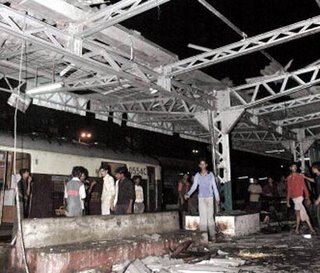India is under siege. With two serial blasts that killed 50 people and injured many more, live bombs defused in Surat and Ahmedabad, and bomb alerts in Kerala, Chennai and Delhi, fear is ruling the minds of people across the country. We wonder every day where terrorists will strike next. Make no mistake, this is a cunning, low-intensity war against the country, aimed at wrecking its social and economic fabric. Regrettably, the response of our governments — state and central — is hardly reassuring. The sheer incompetence of our security mechanism can only serve as an incentive to continuing attacks. We, however, should not turn into cynics or merely shrug at the failure of our administrators to meet the challenge posed by the merchants of terror. A hard look at India's experience in dealing with terrorism is urgently necessary to analyse why our institutions have failed to check the onslaught of terror.
There are multiple agencies to fight terrorism. They generate a huge mass of data. But how much of it is actionable intelligence? Very little, it appears. Take the Gujarat blasts. The attacks in Ahmedabad took place a day after Bangalore was targeted and when the state was already under a high security alert. In other words, the information from intelligence agencies was not sufficient to prevent the attacks or nab the attackers after they had set off the bombs. Of course, these terrorist groups choose their targets and execute the attacks after a great deal of planning with precision. But why are they almost always a step ahead of our sleuths? Over 550 people have died in various terrorist attacks since 2005. How many of the attackers have been arrested and prosecuted?
Security agencies have made arrests after terror strikes, but how many of these cases have withstood the scrutiny of the law? Obviously, there is something seriously inadequate in our security apparatus. Citizens of this country have the right to know where exactly the deficiencies lie. Are the intelligence agencies not adequately funded? Are the personnel improperly trained or not equipped with the latest technology? Surely, the Union home minister can find time to answer such questions.
The prime minister and the home minister have talked of setting up a new federal agency to counter terrorism. We have supported the suggestion in these columns. Law and order is a state subject. There are federal agencies — like the CBI and the IB — besides state police and local intelligence networks. The CBI has no mandate or resources to gather intelligence and its role as an investigating agency is subject to state governments' requests. In fact, a multiplicity of security agencies probably hampers any real crackdown on terrorism unless there is proper coordination among them. The US experience may be worth examining to help India relook at its security system. After 9/11, the US brought various government agencies under the umbrella of the Department of Homeland Security, a new cabinet department in the White House. Coordination became much easier and information sharing between agencies became the norm rather than the exception it was.
Even though India has been one of the earliest victims of cross-border terrorism, our security apparatus has remained largely unchanged. Terrorism has changed a great deal in the last decade. Today, it is a globally-networked phenomenon and its highly motivated foot soldiers do not respect geographical boundaries. And their concerns are not always local grievances. In such a situation, standard methods of policing may not be effective though the international dimension of today's terrorism does not diminish the role of local intelligence.
On the contrary, there has to be more emphasis on local intelligence to spot and monitor radical tendencies in society. Intelligence agencies may have to recruit more personnel from under-represented sections of the people to gain dependable awareness of complex undercurrents in our polity. And the political masters should allow the agencies a free hand to focus on their core job, which is dealing with the security of citizens. A new internal security doctrine, that is in tune with the new circumstances and takes careful note of international experience, needs to be worked out. The time for it is now.
While the government revamps the intelligence gathering apparatus and investigation mechanism, it should act fast on the legal system. When charges of terrorism are pressed in court, it takes years before they are settled. Suspects are jailed for inordinately long periods, often only to be cleared of charges. Such miscarriage of justice adds to the general suspicion that public institutions like the police and the judiciary are prejudiced. The judicial process not only has to be fast, fair and firm; it should appear to be so. More fast-track courts to try terror charges should be set up, more judges recruited.
A case is often made for draconian laws in the aftermath of terror strikes. However, there is no evidence to back the claim that laws like POTA help the state machinery to contain terrorism. Terrorists simply take advantage of the incompetence of the existing security apparatus and not of our allegedly liberal legal framework. Bad laws only undermine the democratic foundations of the country and create social resentment. There are no alternatives to effective policing backed by inclusive public policies. To achieve that, the government must wake up to the gathering storm of low-intensity conflict and act on a war footing
Source - My google.com





 CAclubindia
CAclubindia
